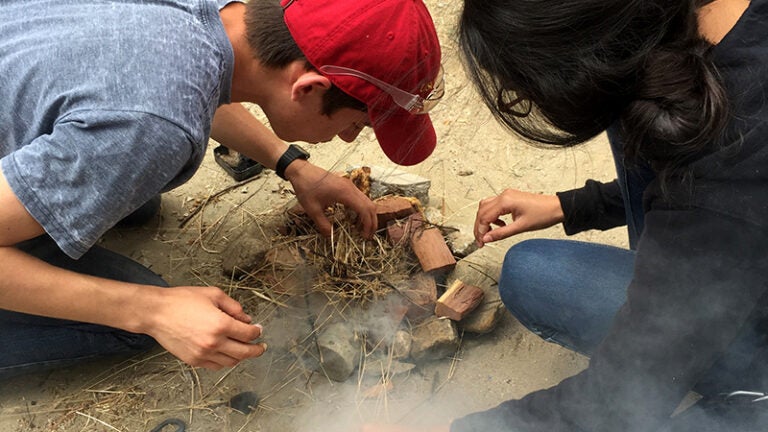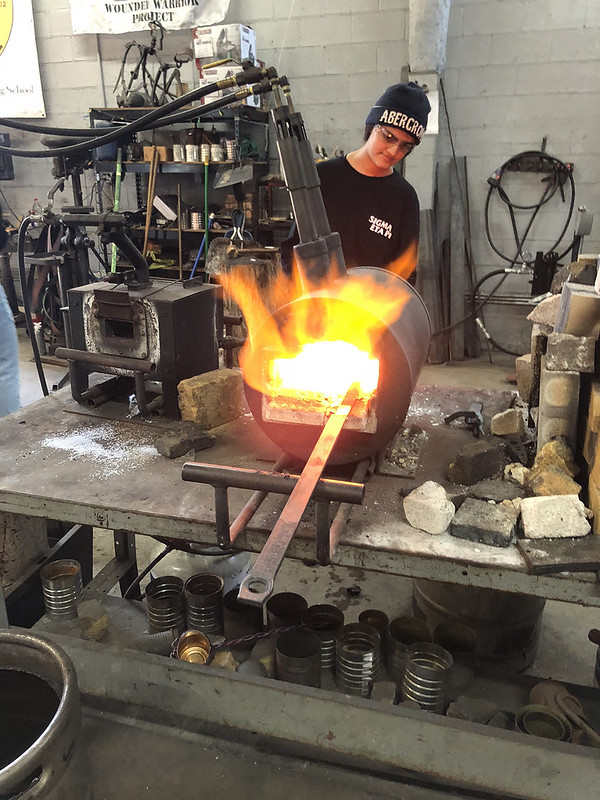
‘Surviving the zombie apocalypse’ course teaches students ancient ways of living
As the first streaks of pink appear in the dawn sky over Santa Catalina Island, the students dip their oars gently into the calm waters as they paddle their kayaks along the coastline, scenting the briny tang of the ocean and marveling at the early morning spectacle of seals and sea lions tumbling playfully in the waves.
The group of 20 USC students were participating in the Maymester course “Exploring Ancient Ways of Living: Experimental Archaeology,” offered by USC Dornsife’s School of Religion.
Led by Lynn Dodd, associate professor of the practice of religion, the month-long course, which includes a three-day fieldtrip to Catalina, enables students to explore premodern life by offering them hands-on experience in such diverse ancient skills as making fire and medicines, crafting ceramics, spinning wool, dyeing, weaving, creating ink from oak galls, archery, cheese-making, and copper smelting.
“The students jokingly call this course ‘How to Survive the Zombie Apocalypse,’ but what I want them to understand is the diversity of resources and skills that underlie everything that we take for granted in our lives today,” Dodd said.
Among the key components of that are the human elements: planning, learning, communication, collaboration and cooperation. Students, Dodd notes, will never look at a knife the same way again after smelting the metal to make their own.
Fire or fail
Forbidden from using matches, students must master the ability to make fire using a fire stick to pass the class. The process is a lot harder than it looks on YouTube videos, Dodd notes — until students understand that collaboration is the key to success.
The process also teaches students to be attentive to group dynamics, different proclivities and ways of communicating.
“There are a lot of reflective assignments in this process,” Dodd said, “so they’re thinking about: How am I reacting? How are others reacting? How am I learning? How are these skills transmitted? What are different ways to learn?”
Under the direction of a professional blacksmith, students forge their own steel strikers from which sparks can be generated. This is an essential aid on a course that teaches students how to make cheese, bread, candles and soap, all of which require fire.
One of the key concepts Dodd wants students to grasp is a sense of the time and quantity of materials needed to make essential items.
By making their own mozzarella, students learn that a gallon of full cream milk yields a relatively small amount of cheese.
“As a result, people look at cheese in a different way and really think about what an incredibly potent source of calories and nutrition it is,” Dodd said.
Our shared human past
Native American tribal members from the local Tongva community shared with the students their traditional food practices, such as roasting agave and grinding acorns and mesquite into flour.
Students are surprised by what is available in the environment, Dodd noted, from food and medicinal plants to materials to create fire, weave, dye and make cord — important for everything from sailing to horseback riding, nets to bags and traps.
During their visit to the USC Dornsife Wrigley Marine Science Center on Catalina, students were able to identify many of the plants and animals that supported people who lived on this island.
Although the students learn many important survival skills, Dodd stresses that she isn’t teaching a survival course.
“Maybe someday I will, but this is an experimental archeology class — we are using traditional techniques to understand how we create knowledge about our shared human past. There’s real innovation in the fact that traditional ways of living can teach us something today.”
Bonding experience
The course is open to all USC undergraduates regardless of major.

Austin Welsh, a former course participant, said the class was everything he’d dreamed it would be.
“I spend my Tuesdays doing a bit of philosophy, economics, theater, and now, a bit of copper smelting,” he said.
Rain Cinco, a senior at USC Viterbi School of Engineering, came out of the course with a newfound appreciation for the environment and other cultures.
“When members of the Tongva community talked about the difficulty of keeping Native American traditions alive, I got to better understand a culture that was entirely new to me.”
Dodd says the course is designed to provide a group bonding experience as well as an intense reflection process.
“As much as students come to understand how we create knowledge about how we, as a human species, have developed, innovated and survived, they’re also learning about themselves and about ways that they can succeed in the future,” she said.
The most important thing she hopes students take away from the class is that our future evolution and success will depend on our ability to learn and to collaborate.